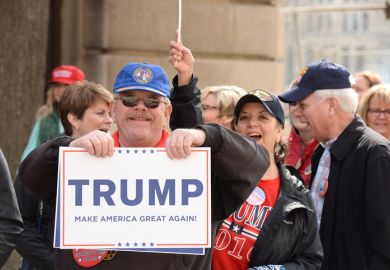The growing diploma divide between Republicans and Democrats; the violent clashes over the pro-Palestinian encampments; the near-constant culture war battles over campus issues: to many, US colleges have come to symbolise the deep political divisions of 2024.
There was once an idea that higher education was an “oasis” away from society, but Nicholas Longo, professor and co-director of the Dialogue, Inclusion and Democracy Lab at Providence College, told Times Higher Education that the sector had increasingly become the focal point of the culture wars.
The public no longer trusts the sector, but higher education has not attempted to forge a “reciprocal sustained relationship” with its critics outside campus, he added.
Charles Ansell, vice-president for research, policy and advocacy at Complete College America, said institutions’ inability to help students complete college caused them to lose trust in public systems and breaks down their faith in civic engagement and democracy.
“With so much at stake, we need to do the hard work of supporting students, funding state completion goals that benefit our communities and country and use metrics to assure that we stay on-track towards dramatic growth,” he said.
“Failure in these efforts deepens the political divide and distrust in systems – it’s an indirect but powerful thing.”
Higher education was not blameless, agreed Matt vandenBerg, president of Ohio Wesleyan University. He said it had often rested on its laurels instead of building bridges to those who see it as “remote, elitist or disconnected”.
At a time of social media echo chambers and polarising narratives, Dr vandenBerg said, higher education “stands accused of choosing sides in battles it didn’t start”.
“The irony is that colleges are meant to be sanctuaries of self-discovery, not symbols of division,” he said.
“When done right, they are spaces where young people learn to hold complexity, wrestle with nuance and find truth in contradiction – a gift our fractured nation and world need sorely.”
Dr vandenBerg called for the sector to lead by example in a divided nation and become “laboratories of reconciliation”, but warned that the lessons could not stay merely on campus.
“Through partnerships with communities, dialogues that extend beyond the ivory tower and graduates equipped not just with skills but with empathy and emotional intelligence, colleges can send ripples of understanding outward,” he continued.
“The work is messy, imperfect and long-term. But if higher education isn’t in the business of healing and advancing the nation and world, then why do we exist?”
As one of the “jewels of American society”, Professor Longo said, higher education had the central role of depolarising the country – and solving the “backlash” against the sector itself.
It must rebuild trust between higher education and communities by solving real-world problems, provide the next generation with the skillsets to “bridge the divides” and create pipelines for people to be able to attend higher education.
“Higher education has this amazing role and responsibility to play in that, but we can’t just shrink from what’s possible, hunker down for four years and hope for the best,” he said.
“We have to be proactive about reaching out to the public, building relationships, solving problems, figuring out how our resources can be helpful to bridging divides.”
To help heal divisions, Mr Ansell said, colleges should implement proven reforms to boost completion and graduation rates, partner with the student success community in civic engagement work and teach information literacy in a “rampant age of disinformation”.
“These efforts will be essential for economic mobility but also for ensuring that Americans can be discerning and interpret information that will play a role in their civic participation.”
Register to continue
Why register?
- Registration is free and only takes a moment
- Once registered, you can read 3 articles a month
- Sign up for our newsletter
Subscribe
Or subscribe for unlimited access to:
- Unlimited access to news, views, insights & reviews
- Digital editions
- Digital access to THE’s university and college rankings analysis
Already registered or a current subscriber?









